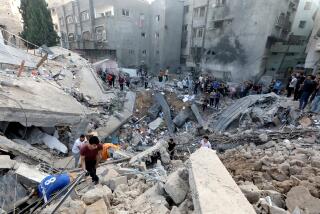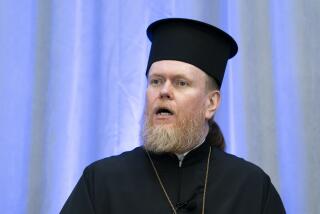Religious Groups Split Over NATO Bombing
- Share via
With NATO’s air bombardment of Yugoslavia starting this week, religious organizations voiced sharply divergent views of the operation.
Muslim groups, concerned with the welfare of Kosovo’s mostly Muslim Albanian population, have strongly backed the air attacks against Serbian targets in Yugoslavia.
The Kosova Task Force USA, which includes more than a dozen American Muslim organizations, called the NATO attacks “long overdue.” (Kosova is the Albanian spelling for Kosovo.)
Abdul Malik Mujahid, the group’s national coordinator, urged the military campaign to continue until Yugoslav President Slobodan Milosevic “agrees to stop his aggression and to allow freedom and independence for Kosova and its people.”
Several American Jewish groups also backed the NATO attacks. The Religious Action Center of Reform Judaism, in a letter to President Clinton, said: “We share your view that the U.S. and our allies must take firm steps to prevent further violence in the region.” The Reform group said that “as people who still live in the shadow of their own experience with genocide, we know all too well the cost of inaction in the face of ‘ethnic cleansing.’ ”
The American Jewish Committee called the NATO attacks “a necessary step to arrest the violence directed by Belgrade against ethnic Albanians in Kosovo, and it has our support.”
But several Christian and interfaith peace groups voiced opposition, including the American Friends Service Committee, the Quaker organization, and the Fellowship for Reconciliation, an interfaith group that promotes nonviolent solutions.
The bombing is likely to “strengthen extremists in Serbia and Kosova and greatly weakens the forces of moderation in Albanian and Serbian communities in Kosova, and the democratic opposition within Serbia,” the Fellowship said in a statement.
Washington-based Sojourners, a socially liberal evangelical group, said “the U.S.-led air strikes in Kosovo will not solve the region’s problems. . . . On the contrary, air strikes threaten to not only increase hostilities, put both Serb and Albanian civilians at risk, and damage the possibilities for peace in the region, but carry the risk of expanding the violence even beyond its current confines.”
The National Council of Churches’ world service unit also urged an end to the bombing and called on the United Nations Security Council “to pursue a peaceful settlement to the long-standing [Kosovo] conflict.”
At the Vatican, officials this week appealed directly to Belgrade to reopen dialogue and said Pope John Paul II was deeply concerned over the suffering of all people in the country.
“The Holy Father is deeply worried about the suffering of people hit by the painful circumstances in which they find themselves,” chief Vatican spokesman Joaquin Navarro-Valls said.
More to Read
Sign up for Essential California
The most important California stories and recommendations in your inbox every morning.
You may occasionally receive promotional content from the Los Angeles Times.












